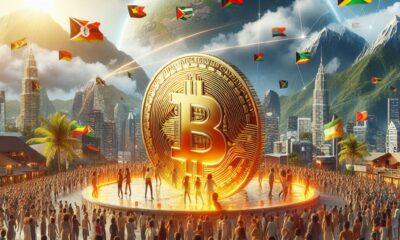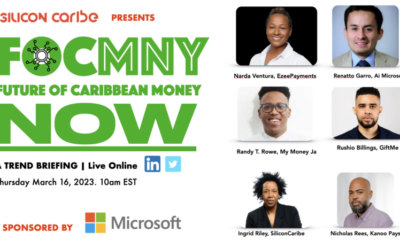Digital Trends
Bitcoin & The Bahamas: Freedom And Independence In A New Age
Published
3 years agoon
By
SC Teamby Leroy Forbes
In July, the country often reflects on its past — but with the beginning of August, let’s talk a bit about its potential future.
While all are more than welcome to read this piece, I’m writing primarily this as a message to The Bahamas. I’ll try not to run on too much 🙂
On July 10, 48 years ago, the Union Jack, which once proudly billowed in the cool breezes of The Bahamas, was lowered and shipped back to the UK with no return address on the label.
If my exaggeration wasn’t clear enough: The Commonwealth of The Bahamas had officially gained self-governance and independence from the British.
Unlike our US neighbors (who got independence way back in 1776), The Bahamas was still under the loving wing of the British empire well into the 20th century. In fact, the island nation remained a British colony until July 10,1973 when, through the collective efforts of Sir Lynden Pindling and supporters of the Progressive Liberal Party, the country gained governmental independence and separation from the British monarchy (kinda.. there are still relative ties to the British crown, but I promised that I wouldn’t run on).
So what did this “independence” mean for the country?
Well.. it meant that The Bahamas was now fully autonomous and, as a country, the Bahamian people were able to do whatever they wanted, whenever they wanted (within reason), with little to no oversight from any outside authority.
“What does any of this have to do with bitcoin though?”
Great question — we’re getting to that. Let’s talk real quick about money in The Bahamas first (not “what is the country’s money”, but more so “how is the country’s money”.. it’ll make sense in a bit, trust me).
The Bahamas is one of the world’s top tourist destinations.. I think we can agree that this is a common fact that most people are aware of. People fly in from around the world, year-round, to enjoy the country’s sun, sand and sea. One fact that most people outside The Bahamas don’t know, though, is that the industry created by this large influx of tourists accounts for over 75% of the country’s GDP (meanwhile, offshore banking and other financial services come in a not-even-close second place, with only ~15% of the GDP).
What does that mean? To put it simply, the majority of the country’s money, either directly or indirectly, comes from tourism. This isn’t anything new either. For as long as I can remember (being born in The Bahamas), the tourism industry has always been the flagship of the Bahamian economy.
As you can probably guess, though, this isn’t the most sustainable business model for a country to rely on so heavily. The still lingering effects of the COVID-19 pandemic alone serve as a glaring example of what can go wrong when a country is so “dependent” on a single industry — especially one that essentially relies on visitors/non-Bahamians to physically bring money into the country.
A few other important things to note before we move on:
- The population of The Bahamas currently sits at ~397,000 people [Re:Population Stat].
- The local currency (the Bahamian dollar) has almost a 1:1 ratio of value with the US dollar.
- Minimum wage in The Bahamas, at the time of writing this article, is $5.25/hr (or $210/wk). This roughly works out to ~$11k/yr.
- Recent studies have shown that ~15% of the Bahamian population lives below the poverty line (which currently sits at only ~$5,000/yr, compared to the poverty line of ~$12,500/yr in the US) [Re:Tribune article].
- The Bahamas’ GDP for 2020 was ~$11.25B (USD).
Some people even go as far as to argue that the Bahamian economy would have been better off had the country remained a British colony (…no comment).
“So, how should these economic situations be approached by the Bahamian people &/or government?”
Well.. that’s the multi-million dollar question, isn’t it? This is the overarching topic that has Bahamian politicians and governing officials flooding the airwaves during the current election season. Every interview. Every question. Every press release. The focal point of most of these discussions is the same: what available options can help the country to progress and to move itself into a better position for its future and the future of its citizens?
“Well, you brought up bitcoin and independence, right? Are you trying to say that bitcoin can fix these economic issues?”
Short, honest answer:
I don’t know for sure.. but in my opinion, it would help way more than it would hurt.
In all fairness, there’s no way that I can say with absolute certainty whether or not bitcoin adoption can fix the country’s economic problems (mainly because I’m not an expert in law, economics, finance, and whatever else people use to run countries), but I’m positive that it would be a huge step in the right direction.
And when I say “bitcoin adoption” here, I’m not talking about bitcoin replacing the current financial system (..yet); I’m talking about making the bitcoin system easily accessible to Bahamians alongside the current system.
Let’s look at El Salvador real quick.
After what started off as an experiment in a local beach town, El Salvador, the smallest Central American country, went on to become the first country in the world to make bitcoin “legal tender”. With the country having the US dollar as their national currency, they’ve decided to offer bitcoin to their citizens as an alternative/option,as opposed to a replacement. Once they begin to fully enforce the new “Bitcoin Law” on Sept. 7, bitcoin could be used to buy a coffee, pay their taxes, hire a hitman (don’t do that last one.. it’s easily traceable and you will get caught), etc.— everything that people once did with USD, could now be done with bitcoin as well.
Also — three quick facts about El Salvador for a bit more context:
- The population of El Salvador currently sits at ~6.5M people [Re:Population Stat].
- Recent studies have shown that ~22% of the Salvadoran population lives below the poverty line (which currently sits at only ~$5.50/day) [Re:MacroTrends].
- El Salvador’s GDP for 2020 was $24.61B (USD).
Will there be problems with the initial rollout?
More than likely — tech rarely functions exactly as expected right out the gate.
Will it work out in the end?
Only time will tell (..but I’d bet money that it will).
“So essentially, El Salvador is taking a gamble on this whole bitcoin thing then? And you think that The Bahamas should take the same gamble?”
I mean…
…
Yeah.
What is there to actually lose from increasing Bahamian access to bitcoin?
Let’s take a step back so we can zoom out for a moment. Compared to The Bahamas, El Salvador is a country with:
- over 16x the population.
- a higher percentage of people living below their relative poverty line.
- a lower minimum wage.
Despite these things, though, the country still pushes forward into unknown territory, in an attempt to innovate and introduce something that has the potential to greatly benefit the country and its citizens, in both their short- and long-term futures.
And let’s be real — there is no way that a move of this magnitude would be made by the leader of an entire country without serious forethought and planning. I highly doubt that President Bukele woke up one morning and, in a rushed panic, decided to start accepting bitcoin in a last-ditch effort to “save the country” or “cash in on the crypto hype”. Being an experienced businessman and politician, the Salvadoran president no doubt consulted with dozens of experts (both local and foreign) to get unbiased info about the crypto and come to a conclusion that they felt would be best for their country.
By the way.. let’s not forget that it’s not just El Salvador that’s looking toward a future with crypto. Like a f***boy from Tinder, crypto doesn’t want to be exclusive and has hit up multiple countries with that late-night, 3AM “You up?” text. Numerous African countries, like Nigeria, Ghana, and Zimbabwe, have already been using bitcoin as a medium of exchange (by both individuals and businesses) for things like fundraising, remittances, and day-to-day transactions. Over in places like the Philippines, people have been able to supplement their income and provide for their families with the crypto that they earn from a crypto video game. Even over here in the West, with each passing day, we see more and more businesses getting involved in crypto — and not just accepting them as payment for their goods and services, but also directly investing in the crypto for themselves.
Even central bank digital currencies/CBDCs (aka the illegitimate cousins of crypto that don’t get invited, but find their way to the cookout anyway) are starting to pick up some steam globally. These digital assets are currently in some phase of implementation in over 80 countries around the world and, while they do stray from the core principles of crypto, they can easily serve as a bridge between many new people in the space and the world of crypto. And don’t forget which country was the first to successfully launch a CBDC. Hint hint.
So, again, I raise my main question — what is there to lose by opening up The Bahamas to the world of crypto? What’s stopping the Bahamian government from taking a page from El Salvador and making bitcoin easily available for Bahamian individuals and businesses alongside the Sand Dollar (the Bahamian CBDC) and Bahamian dollar?
Short answer: nothing, really.
The country already has a system in place for the Sand Dollar, so digital payments are ALREADY set to be a part of the country’s near future anyway. Just add bitcoin to the bunch. The next steps wouldn’t be difficult to figure out either— focus on the development of better national infrastructure for the growth, development, and adoption of these digital tools.
If tech fosters innovation and cash rules everything around me, then bitcoin, the hybrid of the two, could be used to chart a course into the unknown and to set sail for a “new” Bahamian society with a “new” Bahamian economy. Bitcoin could be the segue for regular Bahamians to access the entire crypto-verse, creating limitless opportunities for anyone with an internet-connected device.
In this “new economic system”, the people of The Bahamas would have access to way more opportunities than they did before. They could create new lanes, new markets, new industries.. or even just improve the ones that are currently in place.
With just a QR code on a piece of paper, business owners could accept bitcoin for their goods and services. Cash payments would now be optional instead of mandatory (as it unfortunately still is with so many businesses). It took YEARS for Bamboo to accept card payments.. imagine going there tomorrow and being able to pay with just your phone.
Ivy league schools in the US have these things called “endowment funds.” These are basically just pools of money/capital (that they mainly get through charitable donations from alums and donors) that they use for personal development and/or investments. Over the past couple years, a decent chunk of these funds have been dedicated to bitcoin investments — the schools see the potential for their investment to make them even more money over time. If something like this doesn’t already exist, Bahamian schools (like UB, SAC, GHS, etc.) could easily follow suit, gaining the ability to quickly accept donations/payments from anywhere in the world, at any time.
The country’s GDP could finally be more diversified so that the majority of the country’s eggs wouldn’t be in the same (unreliable) basket.
Often, international payments (both online and offline) can be a hassle when using a Bahamian bank account. And don’t even get me started on banking and conversion fees! With bitcoin, the process would be easier and the fees would be significantly lower, helping to retain more of your money/purchasing power.
With the proper infrastructure and adequate education in place, there could even be more opportunities for Bahamians living below the poverty line to start to save more of the money that they make and slowly build and preserve wealth over time. It may not solve poverty, but it could definitely help to decrease it.
I could keep going, but I think you can see what I’m getting at by now. And… I mean… if the government moves too slowly on bitcoin adoption, what’s to prevent the Bahamian people from taking the initiative and kick-starting the process themselves? It’s open-source software. That means that, if you have an internet connection, you can get started using bitcoin yourself.. right now.. for free.
Just sayin..
“Bitcoin”, “freedom” and “independence” go hand-in-hand.
By design, bitcoin helps to fill in the many gaps that were created by today’s global financial system — a system that has left many smaller nations to fend for themselves and has forced them to bow to many of the bigger players for just a seat at the table.
Bitcoin is like the master carpenter that teaches you how to build your own home. It’s the wilderness expert that teaches you how to catch and prepare your own food and survive on your own. It’s Mr. Miyagi teaching you to wax on, wax off and crane kick blonde guys from rival dojos.
Yes, I’m aware that there would need to be massive infrastructural upgrades for this kind of project. Yes, I’m aware that it would take a significant amount of time and planning for this to be executed successfully. Yes, I’m aware that there is no 100% guarantee that it would work.
But again, and I cannot stress this enough… why not try it? What is there to lose if we do? If there is even a slight chance that this tech could help us to move away from a (mostly) dependent economy to true independence, shouldn’t we at least give it a shot? Every great invention/discovery/adventure in history started with a first step — a leap of faith.
Worst case scenario — nothing changes and we’re in the same boat that we’re in now.. but we would have bitcoin. I think I can live with that.
$/@LeroyForbesJr | Crypto Education | Digital Marketing | Writer | Content Creator | Tech Nerd | ACG Weeb | Smoke Seeker | Black Guy Voting for Everyone Black
*Disclaimer: I’m no economist, nor do I claim to be an expert in the country’s economic affairs; these are just the thoughts of a mildly educated observer and should be treated as such. I am not a financial/investment advisor, this article is not financial/investment advice and any information shared here should be personally researched prior to making any financial/investment decisions.*
You may like
-


WHat Does America’s Approval of BITCOIN ETFs Really Mean For Them and The Caribbean ?
-


Unlocking Investment Opportunities: How and When To Raise Money from Investors for Your Startup.
-


Meet Our Speakers and See Agenda for Future of Caribbean Money Trend Briefing Live Online on Linkedin and Twitter this Thursday March 16.
Trending
-
Tech News14 years ago
JamaicaObserver.com steps it up again with Social Media Plugins
-

 eCommerce1 year ago
eCommerce1 year agoHow Amazon.com Shipped Directly To My door in Jamaica, Finally!
-
Tech News15 years ago
Indiagames Partners With IPL And Facebook To Launch Social Cricket Games
-
Tech News17 years ago
TOP 10 Jamaican sites visited by Jamaicans…now